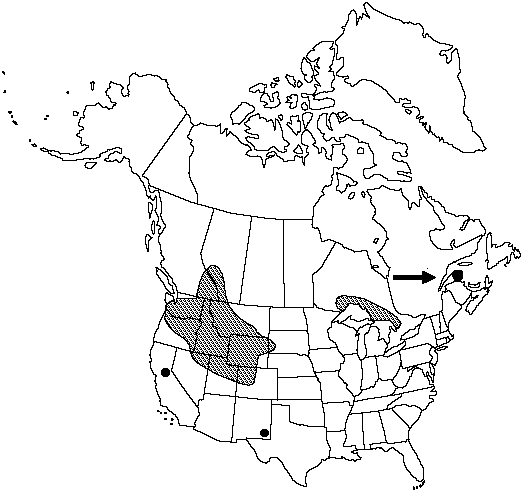Difference between revisions of "Woodsia scopulina subsp. laurentiana"
Contr. Univ. Michigan Herb. 19: 59. 1993.
FNA>Volume Importer |
FNA>Volume Importer |
||
| Line 16: | Line 16: | ||
}}<!-- | }}<!-- | ||
| − | --><span class="statement" id="st- | + | --><span class="statement" id="st-undefined" data-properties=""><b>Scales </b>of stems and petiole bases (at least some) with clusters of dark, occluded cells near center forming narrow, usually discontinuous stripe, scales ovate-lanceolate. <b>Pinnae</b> with longest hairs composed of 2–5 cells. <b>Indusial</b> segments narrow, often filamentous distally. <b>Spores</b> averaging 50–57 µm. <b>2n</b> = 152.</span><!-- |
-->{{Treatment/Body | -->{{Treatment/Body | ||
| + | |phenology=Sporulating summer–fall. | ||
|habitat=Cliffs and rocky slopes, found on a variety of substrates including both granite and limestone | |habitat=Cliffs and rocky slopes, found on a variety of substrates including both granite and limestone | ||
|elevation=0–3000 m | |elevation=0–3000 m | ||
| Line 38: | Line 39: | ||
|basionyms= | |basionyms= | ||
|family=Dryopteridaceae | |family=Dryopteridaceae | ||
| + | |phenology=Sporulating summer–fall. | ||
|habitat=Cliffs and rocky slopes, found on a variety of substrates including both granite and limestone | |habitat=Cliffs and rocky slopes, found on a variety of substrates including both granite and limestone | ||
|elevation=0–3000 m | |elevation=0–3000 m | ||
| Line 45: | Line 47: | ||
|publication year=1993 | |publication year=1993 | ||
|special status= | |special status= | ||
| − | |source xml=https://jpend@bitbucket.org/aafc-mbb/fna- | + | |source xml=https://jpend@bitbucket.org/aafc-mbb/fna-data-curation.git/src/9216fc802291cd3df363fd52122300479582ede7/coarse_grained_fna_xml/V2/V2_314.xml |
|genus=Woodsia | |genus=Woodsia | ||
|species=Woodsia scopulina | |species=Woodsia scopulina | ||
|subspecies=Woodsia scopulina subsp. laurentiana | |subspecies=Woodsia scopulina subsp. laurentiana | ||
| − | |||
| − | |||
| − | |||
| − | |||
| − | |||
| − | |||
| − | |||
| − | |||
| − | |||
| − | |||
}}<!-- | }}<!-- | ||
-->[[Category:Treatment]][[Category:Woodsia scopulina]] | -->[[Category:Treatment]][[Category:Woodsia scopulina]] | ||
Revision as of 13:16, 27 July 2019
Scales of stems and petiole bases (at least some) with clusters of dark, occluded cells near center forming narrow, usually discontinuous stripe, scales ovate-lanceolate. Pinnae with longest hairs composed of 2–5 cells. Indusial segments narrow, often filamentous distally. Spores averaging 50–57 µm. 2n = 152.
Phenology: Sporulating summer–fall.
Habitat: Cliffs and rocky slopes, found on a variety of substrates including both granite and limestone
Elevation: 0–3000 m
Distribution

Alta., B.C., Ont., Que., Ariz., Calif., Colo., Idaho, Mont., Nev., Oreg., S.Dak., Utah, Wash., Wyo.
Discussion
In addition to hybridizing with Woodsia scopulina subsp. scopulina (see comments above), subsp. laurentiana may have crossed with Woodsia oregana subsp. cathcartiana to form W. × maxonii R. M. Tryon. With very few collections and no biosystematic data available, however, the origin of this putative hybrid remains in doubt. Contrary to previous hypotheses (D. F. M. Brown 1964; D. B. Lellinger 1985), Great Lakes populations of W. scopulina were not involved in the origin of the local hybrid known as W. × abbeae (F. S. Wagner 1987).
Selected References
None.